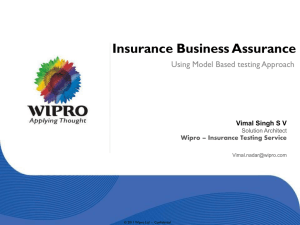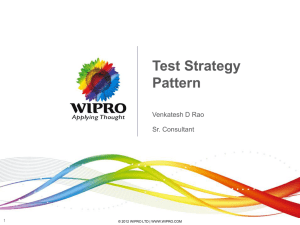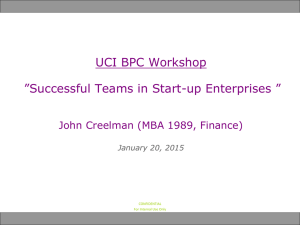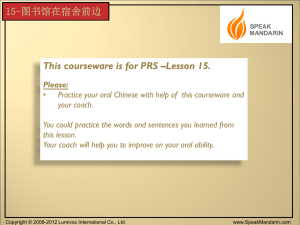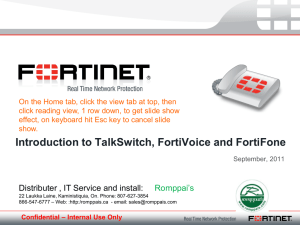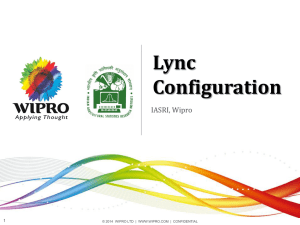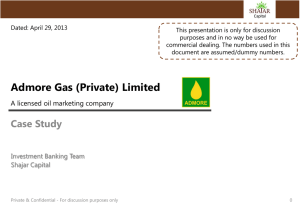Impact of Sales & Procurement on Reverse Logistics
advertisement
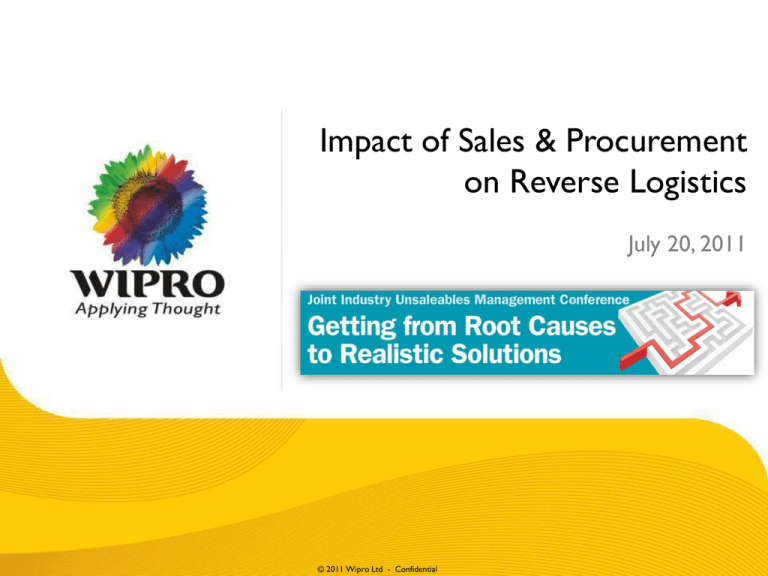
Impact of Sales & Procurement on Reverse Logistics July 20, 2011 © 2011 Wipro Ltd - Confidential Contents Study Overview Objective Methodology Key Findings Current State Common Challenges Summary Findings Recommendations 2 © © 2011 2010 Wipro Wipro Ltd Ltd -- Confidential Confidential Study Overview 3 © 2011 Wipro Ltd - Confidential Objectives Raise Industry awareness of the impact of sales/procurement practices on the escalating amounts of unsaleables in the CPG industry Obtain objective comparisons and analysis to provide insights and recommendations to further engage and/or educate “sales” in their development of future trends in unsaleables management Publish a Report on “The Impact of Sales and Procurement on Reverse Logistics Management” 4 © © 2011 2010 Wipro Wipro Ltd Ltd -- Confidential Confidential Methodology The approach for this study consisted of 4 phases: Data Collection: Development and issuance of a 28 question survey specific to manufacturers and retailers Validation: Individual interviews with subject matter experts split evenly between manufacturers and retailers Analysis: In-depth analysis of the survey, interview results, and published reports Synthesize Findings: Review and summary of the findings with industry experts 5 © © 2011 2010 Wipro Wipro Ltd Ltd -- Confidential Confidential Survey Statistics Manufacturers Retailers Issued to 48 Companies Issued to 14 Companies 48% Response Rate 6 8 + Interviews Survey Results © © 2011 2010 Wipro Wipro Ltd Ltd -- Confidential Confidential 8 + Interviews 43% Response Rate Key Findings Current State & Common Challenges 7 © 2011 Wipro Ltd - Confidential Industry Perspective on Waste Overall rates holding steady, mix changing Average unsaleables rates, as a percent of gross sales, have held relatively steady the past 7 years (.96% for manufacturers and 1.13% for retailers) However, rates for discontinued and out-of-code products continue to increase Decreasing Q: Please indicate the percentage of unsaleables in each category for the most recent fiscal year. Source: Adapted from the GMA, FMI and Wipro Technologies Study – The Impact of Sales & Procurement on Reverse Logistics 8 © © 2011 2010 Wipro Wipro Ltd Ltd -- Confidential Confidential Increasing Industry Perspective on Waste Manufacturers / Retailers agree on scope of issue and 5 common challenges 1. 2. 3. 4. 5. Managing Open Code Dating/Expired Products Managing New Product Introductions/Discontinued Items Capturing and Providing the “Right” Data Enabling Effective Collaboration Internally and Externally Ensuring Proper Accountability and Incentives Q: What are three major challenges facing your company in managing unsaleables effectively? 9 Source: GMA, FMI and Wipro Technologies Study – The Impact of Sales & Procurement on Reverse Logistics © 2010 2011 Wipro Wipro Ltd Ltd -- Confidential Confidential © Key Findings Shelf Life Management 10 © 2011 Wipro Ltd - Confidential Shelf Life Management Companies continue to struggle with open code dating/expired products Remaining shelf life disconnect between manufacturers & retailers (actual days vs. % shelf life remaining) Inconsistent product rotation execution by retailers Product dating variances by manufacturers Continued confusion by consumers regarding product code dates Expired and out-of-code products contribute approximately one-third to the overall cost of unsaleables resulting in an estimated $700 million in expenses for the study group 11 © © 2011 2010 Wipro Wipro Ltd Ltd -- Confidential Confidential Shelf Life Management Remaining shelf life – how much is sufficient? Retailer’s Perspective Manufacturer’s Perspective “Products are coming into warehouse with 30 days shelf life” “The trend is towards a high percentage remaining when it arrives at retailers DC … Needs to be tailored to the specific SKU” “Most manufacturers don’t address shelf life” “ One retailer demands 80% remaining shelf life…creating issues” “ Inconsistency by suppliers & outdated supply chain systems which were not designed to efficiently manage dated shelf stable products is creating issues” “This is an area we are looking at closely. Today we have minimum guaranteed remaining days…. We are reviewing the potential of offering a minimum guarantee based on percent of manufactured code life” “The issue is we can’t control rotation at retail” 12 © © 2011 2010 Wipro Wipro Ltd Ltd -- Confidential Confidential Shelf Life Management Where does the consumer factor in? A new study says that 76 percent of U.S. consumers mistakenly believe certain foods are unsafe to eat after the date printed on the packaging has passed1 61 percent of consumers mistakenly believe the printed date (sell-by) is the final date they can consume the product1 “Endowment effect“ - consumers are still more likely to eat or drink expired products that are already in their possession2 33% of people ignore expiration dates3 Best-if-used-by date preferred by consumers; Sell-by date preferred by retailers 1Source: ShelfLifeAdvice.com and Harris Interactive Journal of Consumer Research 3Source: Parade Magazine 2Source: 13 © © 2011 2010 Wipro Wipro Ltd Ltd -- Confidential Confidential Key Findings Product Planning 14 © 2011 Wipro Ltd - Confidential Product Planning New Product Launch Lack of cross-collaboration related to new product introductions (category management, replenishment, store operations, reclamation) Discontinued Products Fragmented process and delayed communication Exit Strategies Formal exit strategy not used by 23% of manufacturers Sales Promotions 75% of survey respondents report a challenge with promotions execution 15 © © 2011 2010 Wipro Wipro Ltd Ltd -- Confidential Confidential New Product Launch End-to-End planning required for New Product Launch 28% of survey respondents do not address/include any of the below in their new product launches “Five percent of new product introductions fail due to inventory shortage and availability and another 11 percent fail due to an inefficient commercialization process” Q: How do you collaborate with partners in managing new product launches? Q: Do most of your new product launches include? (Check All That Apply) 16 © © 2011 2010 Wipro Wipro Ltd Ltd -- Confidential Confidential Discontinued Products “Discontinued is not included in our unsaleables compensation but as we understand the industry shift from damage to expired/discontinued product at reclaim, we are proposing a more holistic approach that will ensure all players have some skin in the game for Product Lifecycle Management.” – Manufacturing Executive Q: What categories are classified as unsaleables in your organization? (Please check all that apply) 17 © © 2011 2010 Wipro Wipro Ltd Ltd -- Confidential Confidential Exit Strategy Formal exit strategy not used by 23% of manufacturers “Product exit is not “failure,” but should be part of a carefully honed strategy” “While companies have been building their new idea development and execution skills, very few have focused on the equally important and equally frequent ability to successfully remove products from the market.” Q: Retailer - Please indicate in what areas the manufacturer routinely advises you on the product exit strategy? Q: Manufacturer - Please indicate for which products your company utilizes a formal exit strategy with your partners. 18 © © 2011 2010 Wipro Wipro Ltd Ltd -- Confidential Confidential Sales Promotions Trends Issues: 75% of survey respondents report a challenge w/promotions Excess volume Over-buying/selling Poor planning/forecasts and execution Brand & Price Dilution “The biggest issue we have is not having “Some customers are getting more sophisticated and working more closely visibility to real time inventory.” with us to improve promotion planning….. These changes have all lead to reduced “Sales promotions that fail show unsaleables related to expired product.” up in the unsaleables line up to 6 months later so this is an area that “Purchasing Teams and Sales Teams need must be identified sooner.” to coordinate better” to ensure minimal unsaleable stock. Q: What has been the recent trend/impact of sales promotions on unsaleables? Q: At what point in the promotion cycle is further purchasing halted, to ensure minimal unsaleable stock at the end of that cycle? 19 © © 2011 2010 Wipro Wipro Ltd Ltd -- Confidential Confidential Key Findings Collaboration 20 © 2011 Wipro Ltd - Confidential Industry Perspective on Waste Progress slow due to limited formal Waste collaboration Defined Responsibilities Defined Roles Formal Collaboration Regular Touch-Points Q: Which of the following best describes the unsaleables collaboration process with your trading partners. (Please Select One) 21 Source: GMA, FMI and Wipro Technologies Unsaleables Sales & Procurement Study Results © © 2011 2010 Wipro Wipro Ltd Ltd -- Confidential Confidential Shared Data Collaboration Components of Success SHARED VISION SKILLS INCENTIVE RESOURCES PLAN SKILLS INCENTIVE RESOURCES PLAN INCENTIVE RESOURCES PLAN RESOURCES SHARED VISION SHARED VISION SKILLS INCENTIVE SHARED VISION SKILLS INCENTIVE SHARED VISION SKILLS RESOURCES LEADERSHIP CHANGE CONFUSION LEADERSHIP ANXIETY LEADERSHIP FALSE STARTS PLAN LEADERSHIP FRUSTRATION PLAN LEADERSHIP GRADUAL CHANGE Source: J.P. Kotter & P&G ECR 22 © © 2011 2010 Wipro Wipro Ltd Ltd -- Confidential Confidential Key Findings Accountability & Incentives 23 © 2011 Wipro Ltd - Confidential Accountability No direct correlation between success and executive responsibility Indirect Correlation No Correlation Functional Group Unsaleables Rate Cross-Functional Alignment Level of Commitment 24 Senior Executive © © 2011 2010 Wipro Wipro Ltd Ltd -- Confidential Confidential Incentives Providing incentives to manage/limit unsaleables has an impact Opportunity to ensure unsaleables is included in the process “Volume smoothing incentives with Sales have resulted in less volume spikes” - CPG Company Because sales reps are paid on net sales, they are paying more attention to Unsaleables - HPC Company “The weight of unsaleables in that process ………has raised awareness, attention, cooperation, and commitment for improvement amongst our field sales team” – F&B Company Q: What financial and non-financial incentives are in place for Sales/Procurement to manage/limit unsaleables? (Please check all that apply) 25 © © 2011 2010 Wipro Wipro Ltd Ltd -- Confidential Confidential Procurement - SKU Profitability Assigning accountability to Procurement Majority of respondents indicate Procurement is not accountable for profitability at the SKU level* *Note: Either due to process exclusion or system limitations Q: Is procurement accountable for profitability (net profit) at the SKU level? 26 © © 2011 2010 Wipro Wipro Ltd Ltd -- Confidential Confidential Key Findings Demand Chain 27 © 2011 Wipro Ltd - Confidential Collaborative Planning (CPFR) Of those that utilize CPFR approximately 30% of Retailers and 25% of Manufacturers do not include Strategy & Planning nor Analysis as part of their solutions Q: Does your organization have a Collaborative Planning, Forecasting and Replenishment (CPFR) program? Q: What elements of CPFR does your organization use with partners? (Check All That Apply) 28 © © 2011 2010 Wipro Wipro Ltd Ltd -- Confidential Confidential Vendor Managed Inventory 67% of Respondents indicate they have made progress with partners “Promotions can be more easily incorporated into the inventory plan” - Manufacturer Increase Sales Increase in-stock inventory Improve customer service Increase gross margins “In most cases the unsaleables have decreased” - Retailer Reduce overall inventory Q: Are your unsaleables rates lower of higher with those partners with VMI/CPR? 29 © © 2011 2010 Wipro Wipro Ltd Ltd -- Confidential Confidential Recommendations 30 © 2011 Wipro Ltd - Confidential Recommendations Synchronize product data with partner to ensure product shelf life is understood Ensure a product data review process is established to account for changes in data Guarantee a reasonable amount of 'minimum shelf life' to ensure sell through and collaborate with partner Synchronize Product Master Data Drive consistency in product shelf life Shelf Life Management Adopt targeted product rotation 31 © © 2011 2010 Wipro Wipro Ltd Ltd -- Confidential Confidential Explore the potential to base minimum code life on a product's sales velocity and quantities sold to the customer Identify top 10% problem SKU’s, conduct root cause analysis and target for rotation plan or other action Ensure accuracy of planograms and customize to fit fast/slow items with high/low volume stores Reward department leads for reducing out-of-code/expired product Recommendations Consistently apply exit strategies Plan Discontinued Product Communicate exit strategy in writing during program sell-in and obtain agreement from the retailer buying agent Include exit strategy for any item being replaced Implement regular portfolio performance reviews to identify and monitor potential product delist risks or planned exits Include accountability for cost of discontinuation in new item introductions Determine product markdowns with trading partners and a establish a time limit Timely communicate decision to discontinue a product Jointly explore product redeployment options Establish clear hand-over points for each New Product Introduction (NPI) from the ‘project’ team to line operations Reflect optimal store mix in distribution strategy Identify course correction opportunities throughout the product launch/checkpoints Continually monitor actual versus projected sales growth in aggregate, across consumer segments and by store Establish joint coordination for promotion execution Monitor results at specific touch-points Coordinated Planning Coordinate New Product Launch Optimize Sales Promotions 32 © © 2011 2010 Wipro Wipro Ltd Ltd -- Confidential Confidential Recommendations Establish a formal collaboration process Formal Collaboration Accountability, Incentives & Education Match accountability and incentive structure to desired goals and outcomes Assign dedicated resources Define roles & responsibilities Establish regular meetings Openly share data Assign relationship owner/leader Share cost to optimize ownership and involvement Assign SKU profitability goals and accountability metrics to procurement Assign customer profitability and metrics to sales Demand Chain 33 Optimize demand chain © © 2011 2010 Wipro Wipro Ltd Ltd -- Confidential Confidential Include strategy/planning and analysis in collaborative efforts Thank You David Lambert Practice Lead, CPG Consulting david.lambert@wipro.com © 2011 Wipro Ltd - Confidential
